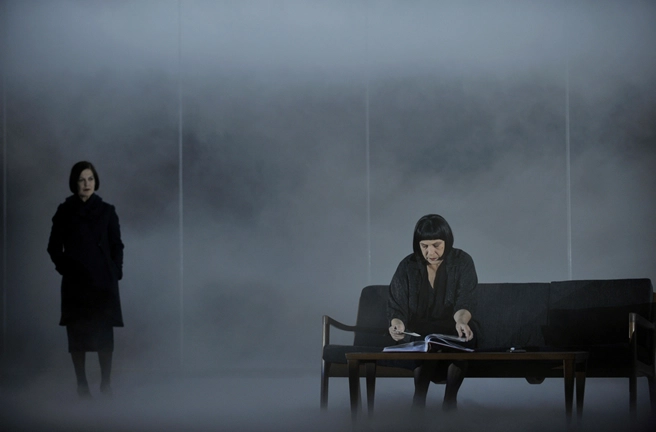John Gabriel Borkman
April 02 2009 to April 11 2009
You cannot better serve society than by cashing in on the metal you're made of.
Ibsen
For years and years a man has been pacing back and forth on the first floor of a house that doesn't belong to him. On the ground floor, his wife can hear his steps, going back and forth, endlessly. She never goes upstairs, he never comes downstairs. Until one evening when the man, leaving his refuge or his cage, rushes down the stairs, goes outside into the snow and vanishes into the forest. What happened that evening, at that crossroads where all of the destinies of a family made a final appointment with each other, is the subject of one of Ibsen's grimmest, bitterest plays, the one the rhythm of which is the most inexorable of all: John Gabriel Borkman. In a career spanning more than half a century, Ibsen (who Pirandello considered as the greatest playwright after Shakespeare) never stopped experimenting with the most diverse approaches in his work. But it is especially the cycle of his last dozen plays that most contributed to his fame and made him, along with Strindberg and Chekhov, the inventor of a new theatricality, where prosaic realism is no obstacle to the exploration of the utmost depths of consciousness. After The Master Builder and Little Eyolf, before When We Dead Awaken, John Gabriel Borkman is the third title in his final tetralogy. Each of these plays centers on a character who is a creator - an architect, a philosopher, a sculptor - who looks back over his work and his life. John Gabriel Borkman is a banker. Or rather, he was a banker, because a spectacular bankruptcy earned him several years in prison, as well as disgrace, from which he never recovered. And yet Borkman seems never to have admitted defeat. Never did he doubt in the demiurgic nature of his mission. In his view a real financier gives life, just as an artist does, to something that owes its creation only to the visionary power of his conceptions. A miner's son, Borkman had always been aware of the wealth that is concealed in the world, waiting to be liberated from its fetters; like a Tantalus fascinated by the treasures that are so near, haunted by their elemental call, he dreams of responding to this call by tearing their energies from rivers, their metals from mountains. But to try to fulfil this dream - and to begin with by attaining the position in finance from which such fulfilment could be carried out - he had to sacrifice in the basest of ways the woman he loved, then ruin entire families...Poet or predator: who, after all, is Borkman? A genuine financial wizard or a selfish failure of an egoist who chose headlong flight and delusions of grandeur so as not to have to confront his failure head on? A "wounded eagle," unaware of his true vocation, or a "sick wolf," blinded by his own will to power? Coming back to Chekhov after his grating and contemporary rereading of "A Doll's House," Thomas Ostermeier will undoubtedly be intent, in order to compose the critical portrait of Borkman, on questioning through him the ravages that are caused by a certain Promethean pretension to being superhuman.


